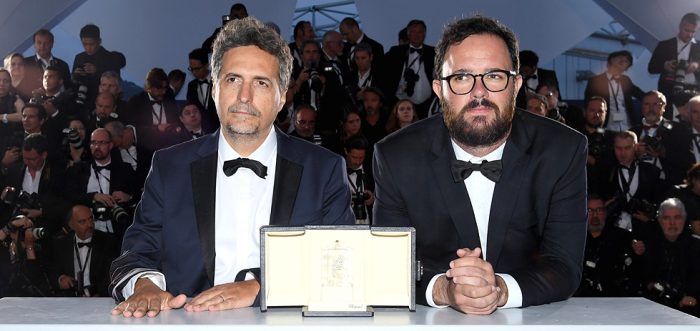Kleber Mendonça Filho made his name with the rhythmic, musically-driven 2012 feature Neighbouring Sounds, cementing it four years later with the similarly soulful, albeit pointedly political, Aquarius – with Juliano Dornelles working on the production design. Dornelles’ same-year debut feature, O Ateliê da Rua do Brum, was based on the life of an atelier of plastic arts in Recife, the capital of the state of Pernambuco in Northeastern Brazil; the region where both filmmakers have predominantly set their respective works, as well as the location for their debut collaboration, Bacurau.
Set in the sertão region (an area and phrase with parallels to Australia’s “outback”) in northeast Brazil, Bacurau follows a small-town ensemble in the wake of the town matriarch’s death. The film’s loose structure — framed as a riff on the Western, before adopting in elements of sci-fi and magic-realism — allows for both a refreshingly imaginative jaunt and a starkly political film, the most pointed made by either filmmaker to date.
Jeremy Elphick sat down with Kleber Mendonça Filho and Juliano Dornelles, the director and producer behind Bacurau, to talk about the region, the wider sociopolitical contexts that inspired the film and the difficulties and growing dangers of making political work in Brazil under the fascist politics and presidency of Jair Bolsonaro.
Where did the inspiration for Bacurau come from?
Kleber Mendonça Filho: I think when you write a script, the biggest challenge is to make it not to do the usual stuff. For example, I was on a plane, and I could see this other person’s monitor watching… Captain Marvel, the recent one.
Juliano Dornelles: Yeah, Captain Marvel.
Mendonça Filho: And then I was looking at it and then a car chase began.And I go, “Why did they write and shoot this car chase? It looks like a thousand car chases.” You know, every other film made over the last 50 years. So, when you’re writing the script, the scenes have to be interesting for you as a challenge. They have to be interesting to you as a good scene, and as a scene that maybe hasn’t really been done many times, and will serve the film narratively.
We were writing and saying “what if…” and then an idea comes in. But it really comes from the desire to make a genre film, and at the same time to have deep roots in reality in Brazil, and in the sertão region. Then you kind of mess it up with “a few years from now” and some ideas about the future, and dystopia, and violence, and violence in cinema, of course.
The other thing we discussed extensively is, and it doesn’t happen anymore these days because… these big commercial films from Hollywood, they are terrified that you will lose… you will, I don’t know, walk out. The first big scene happens very quickly. It doesn’t really establish characters. And so, if you look at commercial films from the past. A great example is James Cameron’s Aliens, in 1986, it takes about 40 minutes for you to actually see the first alien, but the film kind of builds character and the situation, the planet, and the trip to the planet, and we thought that we should do something like that. It would just build atmosphere, and so like a pressure cooker… at the end of the film it’s going to be stronger, because of the basis of what you built.
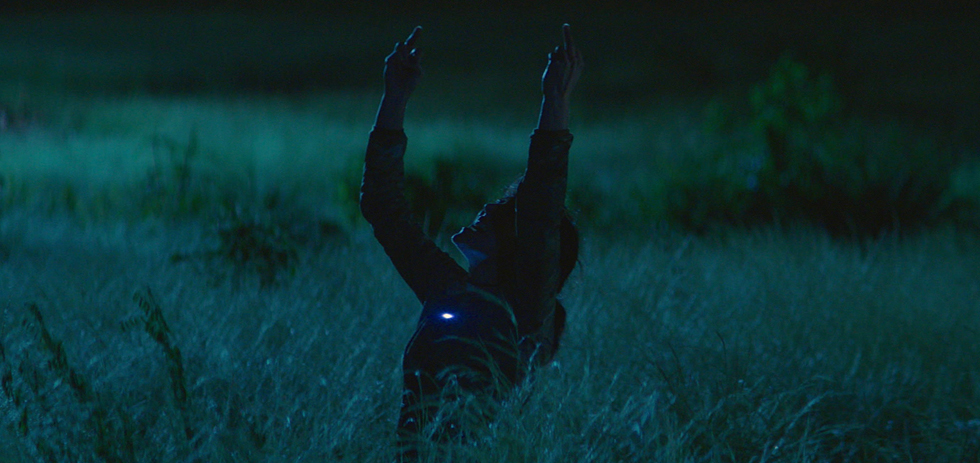
The actual region where Bacurau is set, could you speak at all about where it sits culturally, but also socio –politically within Brazil?
Dornelles: It’s a region in the northeast of Brazil. We call… it has a name of sertão. I don’t know the translation for sertão. I don’t think there is any.
Mendonça Filho: It’s the outback.
Dornelles: Yeah, it’s like the outback. Yeah. And of course, we have many kinds of sertão, sertões. And this particular one is the Cerrado. It’s between two states, Paraiba and Rio Grande do Norte. Two small states, not very rich, as all the states in the northeast. It’s the poorest region in Brazil. And the people are very used to dealing with the –
Mendonça Filho: Adversities.
Dornelles: Adversities. Yeah. And hunger and poverty and hunger and…
Mendonça Filho: Lack of respect.
Dornelles: Yeah, lack of respect. And the past years, in those left –wing government, this reality changed a little bit, I would say changed a lot.
For the better?
Dornelles: For the better. Yes.
Mendonça Filho: They got more attention.
Dornelles: They got more attention.
This is Lula’s government?
Dornelles: Yes.
Mendonça Filho: He comes from that region. Like we do.
Dornelles: Yeah. We always knew that these people are very dignified people, because they have a relationship with life that is different, because nothing comes easy to them. They can value the most important things in life, the way a boy from the big city can’t. I think we never could risk ourselves to make a representation that is not a very, very authentic [one] of these people in this region. So, this is maybe what we wanted to do since the beginning.
Mendonça Filho: This is what we wanted to do since the beginning, but then something amazing happened. We went on location, we worked with great people from the location. And the film just went like this.
Dornelles: Yeah, and there’s another aspect that is very interesting. The presentation of sertão in Brazilian cinema is always as a place that is greyish and dry, in drought – and people are thin and sick and, you know. But when we went there, it started to rain a lot. Yes. A lot. And the landscapes changed immediately. Started to get very green, and nature comes to some kind of enthusiastic booming of flowers and butterflies and little rats. You know, every animal’s fucking a lot, and eating a lot. This works for me as an allegory of the set of people. You only have to give a little bit and they can do many things with that, you know?
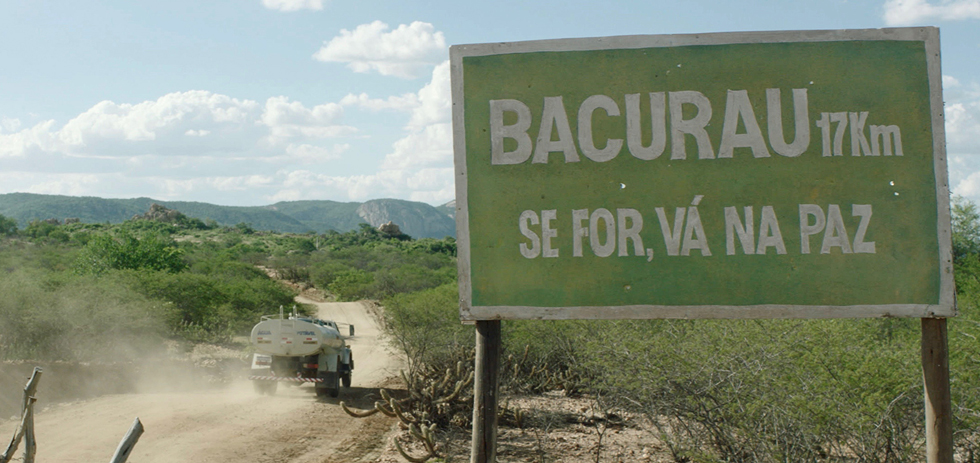
I think it’s really also valuable in terms of showing an area that most overseas people probably wouldn’t recognise as Brazil. It’s normally the cities that are filmed.
Mendonça Filho: Overseas definitely, but we are very curious to see audiences in Brazil reacting to this particular depiction of sertão and the people because it’s quite unusual.
I guess there are two audiences with this film then. Did you think about that at all when you’re making it, or is it something you more think about now since it’s playing festivals?
Mendonça Filho: I don’t think we did. I always wonder. I never think about it in terms of, well let’s do this scene this way… but when I made Neighbouring Sounds, I shot the film on the street where I used to live, and one of the locations is where I used to live, and I thought it was a very local, regional film, and people understood it in many different countries, it became an internationally recognised film. And then Aquarius, the same thing. And with this one, I don’t know, if you have strong drama, and if you shoot it in a cinematic way, I think it will be a film that has some appeal. Of course, an Australian film will be best understood in Australia, because of the little details that… because it’s an Australian film. But if it’s a good film, somebody will like it in Oklahoma or in Iceland, and this is what happens with most good films.
Dornelles: One example, of a very successful film from Australia in Brazil, is Crocodile Dundee. It was a huge success in Brazil. Huge, was huge. There’s a scene in that film with that guy, the Aboriginal actor [David Gulpilil]… where the girl points a camera at him, and he says “Stop.” And the girl said, “Why, do you think I’m going to steal your soul?” And he says “No, no, the lens cap is here, so take it off for you.”
Mendonça Filho: That’s a good joke.
Dornelles: Yeah. And it’s the same thing over there. It’s the prejudice to those people. We deal with it every time. It happened to me when I was shooting a documentary many years ago, I went to a cultural club in Olinda. It’s a historical city in Pernambuco. And the president of this cultural club was sewing a fantasy, a costume of carnival. And they are without a shirt. But he was a very big black man, a strong black man.And I thought he was a beautiful character, the way they were seated for there. And I just pull off my camera and point it to him. When he saw I pointed the camera to him, he said, “Why are you doing this?” I’m just, “It’s beautiful, the image.” “Let me put a shirt first.” And I felt very bad. You know, I was entering his environment and with my camera, and it was an embarrassment that I carry with me today. So I needed to talk about this in Bacurau a little bit.
Elphick: That makes sense. It’s always interesting as well, in the moment, when you’re behind the camera and choosing to capture an image. When shooting can often take place on an intuitive level, I imagine it’s confronting on a level to be asked “what are you doing?”; where you have to consider the premise behind everything?
Dornelles: One of the girls I shot, the couple comes to her and says, “Why are you doing this?” And she says, “I don’t know.”
Yeah, I guess maybe that’s a good way to lead into that. There’s that whole subplot I guess, or main plot of that group, which I think some are Americans.
Mendonça Filho: There’s one Brit. And the German–American.
Dornelles: It was framed as a sort-of hunting group
Mendonça Filho: It’s a hunting group
Dornelles: Touristic.
Mendonça Filho: Organised by some people we never introduce. But you can tell that there is something happening in the earpieces.
Dornelles: It could be a reality show, also.
Mendonça Filho: We chose never to cut to a studio in Texas –
Dornelles: – with Ed Harris talking something.
Mendonça Filho: Yeah, we would never do that. It should be enough just to see them do their thing, and just sense their concern about points and scoring and vintage weapons.
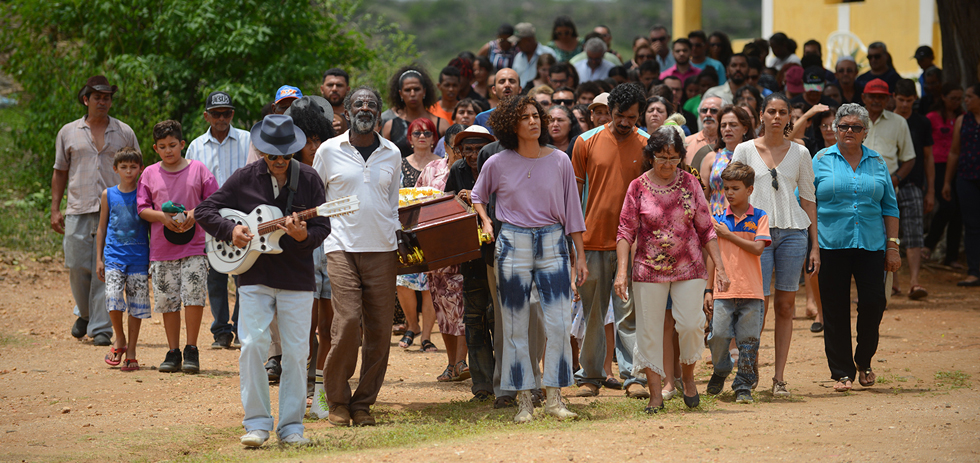
They have same fairly pointed arguments, with comments about ‘what’ different people ‘look’ like. These reminded me a bit of several conversations in Aquarius, where physical appearance and race within Brazil is fairly central.
Mendonça Filho: I think there was a sub-theme, but I’m really psychoanalysing my own film, and I think there are a lot of discussions about who you are and who you think you are and who the world sees, and how the world sees you. And then there’s a lot of politics and power, and apply to all these perceptions of how people are. The Americans, they don’t think very much about that community. They think it could be wiped off the earth.
Dornelles: Nobody will miss them.
Mendonça Filho: Nobody will miss them, because it’s a shithole community. But actually, they are not a shithole community. And then the two –
That statement, when I heard that, it seemed like quite an intentional choice of phrase, the shithole phrase.
Mendonça Filho: The shithole. It was after Trump. And then the German is called a Nazi, which is kind of a cultural cliché. And then the two Brazilians see themselves as white, but then the Americans don’t see the Brazilians as white, which is problematic for them since they see themselves as superior people, Brazilians, as compared to the Bacurau people. That’s another regional tension. People from the south have this age-old relationship to people from the northeast, like us. I went to this junket many years ago, I used to be a film critic, and one of the press people, in a situation like this, she said, “So you’ll need a translator, right?” “No, I speak English.” “Oh, right. So, people from this city, Pernambuco, speaking English, that’s…”
Right. And that’s someone within the country as well?
Mendonça Filho: Oh, yeah. But it happens in many countries. I mean New Yorkers call the Midwest the flyover states. Because all that matters are the west coast and the east coast. You don’t bother with what’s in the middle.
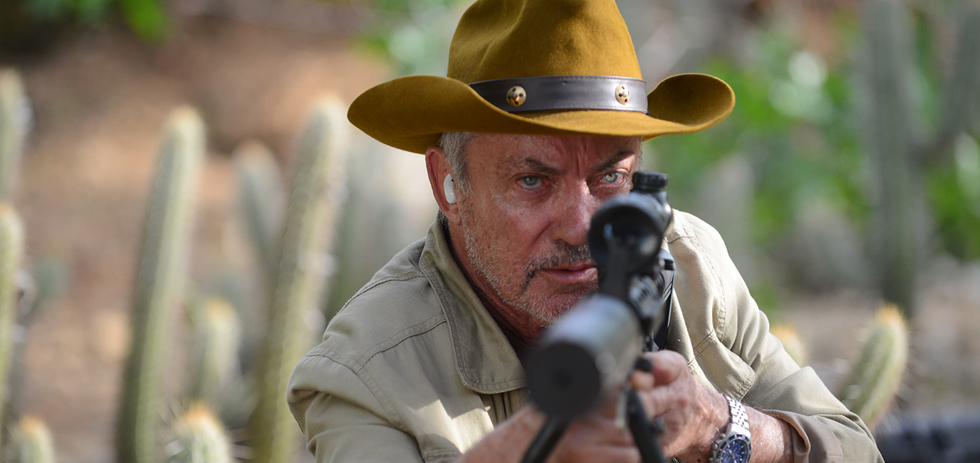
Even here, within New South Wales in Australia, if you drive six hours west, the change is ridiculous, and I swear like 80, 90% of the people in the city would not know how differently people live. You bring up an issue of water supply in the film, which was quite interesting to think of here, because there’s huge droughts and water management issues in New South Wales, in terms of lots of the indigenous and rural communities left without clean water to drink, and flows upstream being redirected or stored for farming and the like.
Mendonça Filho: That’s a very similar problem.
Dornelles: This can happen in many areas. Because when with Lula’s government, those kids started to go to school, actually learn something. They start to win prizes nationally, to beat the southeast, you know.Because they just need the fucking opportunity.
Mendonça Filho: They just needed an opportunity.
Dornelles: That location of the village of Bacurau. It’s not the real name of the place, of course. We needed that place without asphalt roads, only one dirty road that connects it to the world, surrounded by mountains. And there were… I went with a location scout and we met this old lady that invited us to go in her house to see the museum of the city.
Dornelles: When we enter it, at her house, the museum is in the living room. And this is our museum. A lot of photographs and objects and some newspapers, just like the museum in the film, but much smaller… but very dignified. Beautiful.
Mendonça Filho: It wasn’t ridiculous.
Dornelles: No. I felt shivers. It was important, and she was very proud. It’s struggling to exist, to be.
Mendonça Filho: They exist through history, which for me is very, it’s a very interesting idea.We have a very problematic relationship to history. Our main, most important museum just burned down last year. The National Museum. It burned down out of some short circuit. It was underfunded and very badly maintained, and we lost everything. Hundreds of years of records, objects.
Dornelles: And in Brazil things are different from Paris. They raised in one day 1 billion euros to rebuild the Notre Dame.
There are bits, sometimes in the film itself, like in its description in programmes and interviews, where it will be framed as a dystopian kind of film. At the same time it has a lot of grounding in reality, of the situation today, in Brazil over the last year.
Dornelles: We are living ‘the dystopia’.
I feel like in the West – like in Australia, USA and the UK – the knowledge of what’s happened in Brazil in the last three years is not there at all. Bolsonaro is always written about in international press as “Brazil’s Trump” with little interrogation of how simplistic and dangerous that sort of framing is. I think it’s interesting to see how this situation is reflected within your film, which is playing in front of audiences across the world.
Mendonça Filho: Yeah. But one thing that we kept saying is that the film is not really about Bolsonaro. Because when we finished shooting in May last year, Bolsonaro was not –
Elected?
Mendonça Filho: – a possibility. It was a joke. It was, we could never believe that what happened has happened. The other thing is, people say that it’s dystopian and it’s futuristic, but in fact a lot of the problems that we see in the film, they are old. It’s just that they keep coming back. It’s like a society that never learns. You know, the water problem has been going on for over a hundred years. Corruption, people selling the country out to foreigners; all these things – and violence, of course. All of these things.
After the election, do you feel it’s going to be more difficult to screen the film – or to work within Brazil?
Mendonça Filho: The film will be released in August. But now we have cuts for the whole industry. It’s not getting federal money, and this is a new thing, a new development from the Bolsonaro government. He also took out the Ministry of Culture on day one. Very first. So it’s a new challenge. Now everybody’s kind of frightened by the new developments, because they treat it as if.. they have a perverse pleasure in ending film production. They don’t see that it’s actually an industry where people work in jobs, and so it’s a very strange moment. It’s completely dystopian in this sense, because it’s like somebody shutting down the pharmaceutical industry just because he doesn’t like pills. It doesn’t work like that. You can’t do this.
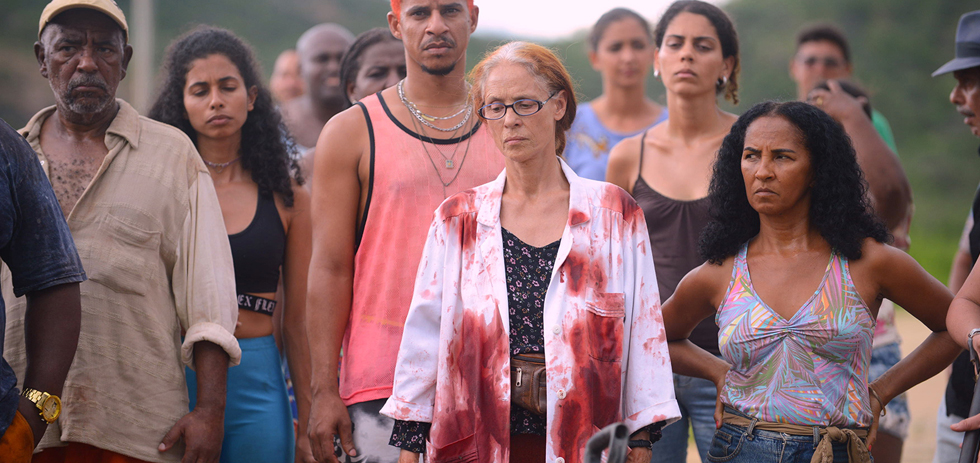
Did you think it was ‘hyperviolent’, or just violent?
I don’t know if I’m desensitised, but I didn’t think it was ‘hyperviolent’ at all. I thought it was violent, but I feel like the situation in Brazil at the moment, I think killings by police in Rio hit a record high this year? I don’t think the violence on screen is excessive, really.
Mendonça Filho: We were surprised with some reactions saying that it’s ‘hyperviolent’, and we thought it was violent, but not ‘hyperviolent’.
I feel like ‘hyperviolent’ refers to something beyond reality, which I don’t think this is. I feel it’s a term that maybe comes out of being disconnected from what violence looks like and how pervasive it is.In that sense, I was curious about the interaction between America – or North America’s – involvement in South American history and how that is echoed in the more guerrilla aspects of the conflict in Bacurau
Dornelles: It’s the same story from the ages between oppressors and oppressed, but we thought a lot about the Vietnam War, because the USA army went there with a lot of money and logistics, and not caring too much about the culture of the place. Not thinking too much about those people over there.
Mendonça Filho: The geography.
Dornelles: The geography… and things went bad.
Mendonça Filho: They got their asses kicked.There are actually things that were lifted from wonderful films on the Vietnam War. They were actually lifted word by word. For example, when they see the bloody clothing hanging by the side of the road, and the guy says, “Fucking savages.” That’s from Apocalypse Now.They’re attacking a peaceful village on a beach, because it’s a great beach for surfing, and the colonel is a surfer. And then during the attack, when they’re basically blowing the hell out of the village, there is a reaction from an artillery in the village, and it hits one of the helicopters. And then the colonel,the Robert Duvall character, says “Fucking savages.”
